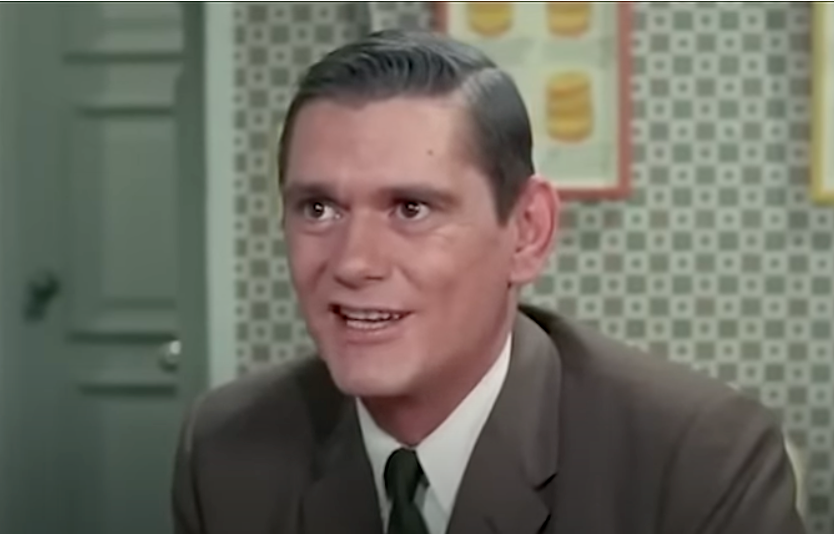Bewitched star was destitute and cleaning toilets before death after career-ending on-set injury
Dick York, who shot to fame as Darrin Stephens in the popular Sixties sitcom, was forced to leave the show after becoming addicted to painkillers
Your support helps us to tell the story
From reproductive rights to climate change to Big Tech, The Independent is on the ground when the story is developing. Whether it's investigating the financials of Elon Musk's pro-Trump PAC or producing our latest documentary, 'The A Word', which shines a light on the American women fighting for reproductive rights, we know how important it is to parse out the facts from the messaging.
At such a critical moment in US history, we need reporters on the ground. Your donation allows us to keep sending journalists to speak to both sides of the story.
The Independent is trusted by Americans across the entire political spectrum. And unlike many other quality news outlets, we choose not to lock Americans out of our reporting and analysis with paywalls. We believe quality journalism should be available to everyone, paid for by those who can afford it.
Your support makes all the difference.The late Bewitched star Dick York was both “financially and physically destitute” after a horrendous on-set injury left him in poor health, author Herbie J. Pilato has revealed.
York, who died from emphysema in 1992 aged 63, rose to global fame playing Darrin Stephens on the popular Sixties sitcom before he was replaced by Dick Sargent for the final three seasons.
His unceremonious exit occurred in 1969 after he became addicted to painkillers, which were initially prescribed to him following an on-set injury while filming the Western drama, They Came to Cordura, 10 years prior.
“Yes, Dick York was financially and physically destitute,” Pilato recently told Fox News. “He just did not have the money anymore. His career had dried up. He was in very poor health. There were no more calls for acting. It was tough to watch.
“Now here I am, just a fan, and then later a friend… to see him in such a horrible situation,” the Twitch Upon a Star author said. “He forced himself to be positive, but he also knew he had to still make money. So, he would end up cleaning apartments to make money.

“He became a cleaning man. He went from being a star of one of the biggest TV shows in the history of television to cleaning toilets. It was humbling for him, and he never complained about it, but… it should not have happened,” Pilato added.
York’s career took a turn when he and his co-stars were propelling a railroad handcar for a scene in the 1959 movie. After the director called “cut,” an extra grabbed hold of the rail that York was pumping and pulling.
“Now, instead of lifting the expected weight, I was suddenly, jarringly, lifting his entire weight off the flatbed — 180 pounds or so. The muscles along the right side of my back tore. They just snapped and let loose,” York said in a 1992 interview published in FilmFax magazine.
“And that was the start of it all — the pain, the painkillers, the addiction, the lost career. I didn’t attend to the problem then. I continued to work through it.”

Watch Apple TV+ free for 7 days
New subscribers only. £8.99/mo. after free trial. Plan auto-renews until cancelled

Watch Apple TV+ free for 7 days
New subscribers only. £8.99/mo. after free trial. Plan auto-renews until cancelled
Eventually, the discs in York’s spine began to compress, leaving him hunched, according to the Los Angeles Times. Instead of seeking medical attention, he took painkillers to try and manage the chronic pain. By the time Bewitched premiered in 1964 on ABC, he was reportedly fully reliant on the medication to get through the day.
The pain became so unbearable at one point that it caused York to collapse and pass out while filming one of the sitcom episodes. He was then hospitalized.
“He never really recovered from the pain,” Pilato said. “He missed 14 episodes. What’s Bewitched without Darrin, without the main conflict of, ‘No, honey, don’t do the magic’?”
“They had to replace him — they didn’t have a choice,” Pilato said. “He felt horrible about it. He did not want to damage the opportunity for all those people who were [working on the series].”
“He didn’t want them to lose their jobs. He didn’t want the show to end, so he just gave in and left. However, he did tell me that if he had that summer of 1969… to fully recover, he [felt] that he would have been able to finish the show.”
Join our commenting forum
Join thought-provoking conversations, follow other Independent readers and see their replies
0Comments